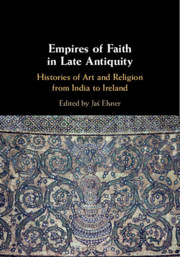Book contents
- Empires of Faith in Late Antiquity
- Empires of Faith in Late Antiquity
- Copyright page
- Contents
- Figures
- Contributors
- Acknowledgements
- 1 Introduction
- Part I The Imperial Context
- Part II After Imperialism: Orientalism and its Resistances
- Part III Post-Colonialist, Old Colonialist and Nationalist Fantasies
- Bibliography
- Index of Names
- Index of Subjects
1 - Introduction
Published online by Cambridge University Press: 29 February 2020
- Empires of Faith in Late Antiquity
- Empires of Faith in Late Antiquity
- Copyright page
- Contents
- Figures
- Contributors
- Acknowledgements
- 1 Introduction
- Part I The Imperial Context
- Part II After Imperialism: Orientalism and its Resistances
- Part III Post-Colonialist, Old Colonialist and Nationalist Fantasies
- Bibliography
- Index of Names
- Index of Subjects
Summary
Let us begin – outside the scope of this volume – with a concept, a metaphor, coined in the fields of social psychology and behavioural economics. The idea of ‘anchoring’ was introduced as a result of the study of how poorly the majority of people perform as intuitive statisticians: human beings tend to use any random number that has been offered to us when we need to make an estimate, and then stay too close to that as an anchor when making revisions.1 If one applies this model to the exercise of historical understanding in dealing with a range of empirical data and with uncertainty in its interpretation, it is clear that scholarship must consistently rely on anchors – more or less random, usually in the form of a current communis opinio, inevitably grounded in initial premises, assumptions, prejudices or values – to establish the starting points for interpretation. And it is equally clear that interpretations inevitably are tied to the anchoring assumptions from which they are generated – a case of hugging close to the anchor. Obviously there are many respects in which such interpretive anchors are common-sense defences against potential rocks or shoals along the coast of scholarly travel (such as excess in speculation). But – especially when anchors are founded in starting points that may at a given time be collectively acceptable but are nonetheless fundamentally erroneous, wrongheaded, or immoral (such as that sound interpretations are possible only from scholars of certain races, a normative premise in Germany between 1933 and 1945) – then anchoring equally obviously prevents clear thought and restrains the scholarly boat from sailing the wide seas in search of truth, or in pursuit at least of new questions and answers.2
- Type
- Chapter
- Information
- Empires of Faith in Late AntiquityHistories of Art and Religion from India to Ireland, pp. 1 - 24Publisher: Cambridge University PressPrint publication year: 2020



